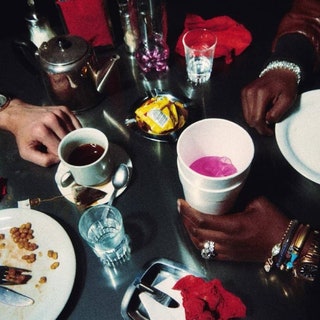
When James Blake and Lil Yachty debuted as divisive wunderkinds, they earned feverish acclaim—and controversy—for the way they blurred the lines etched by their predecessors. Blake stormed dubstep’s dancefloor and rendered it a dusty confessional booth; Yachty looked at the hip-hop landscape he inherited, cursed its gods, and spent the beginning of his career at war with a generation. Not everything has changed: They’re still divisive, and they’re still doggedly trying new things. But they aren’t upstarts anymore; nor are their disruptive ideas breaking boundaries so much as reinforcing them. (So long, saxophones, and so long, rap.) A pair that once embodied youthful iconoclasm now often seem to see only as far as their next grievance. More and more, they sound like the gatekeepers who didn’t believe in them years ago.
Thus the defensive crossover spectacle of Bad Cameo, their new joint album. Few things announce themselves louder than a tag-team LP by a polarizing producer and an equally polarizing rapper-turned-rocker. But instead of provoking, this record largely takes the low-key road, like a terse postscript to a more transgressive past. It’s dreamy and occasionally danceable, steely electronica rubbing shoulders with a sharp, stadium-ready take on Yachty’s sing-rap sensibilities. The shoulder-rubbing is promising, but at a certain point, when the friction hasn’t progressed any further, the party starts to feel like a corporate lunch: Hey Post-Dubstep, have you met Post-Trap? I’ll leave you two alone to hit it off! Sometimes, they do. More often, Blake and Yachty are cozy in their respective corners, taking turns in the spotlight rather than sharing it. You get the sense that they’re trying to rekindle old magic—the wonders Blake worked with his glitchy soul-searching, the weightlessness Yachty proffered with his pitch-shifted lilts. These elements sound nice next to one another. They’d sound even better if they did more than just coexist.
When Yachty released “Poland,” his unlikely 2022 hit single, part of the draw was his quivering, liquid delivery: “It is a really fucking weird song,” Blake told him in a recent sit-down, revealing that it brought him to tears. He’s right to identify the weirdness as jolting—at least enough to channel raw emotion, or inspire it in others. But when they try to accomplish this on Bad Cameo, they sound maddeningly riskless. The title track registers like an attempt to run “Poland” through Blake’s chilly alt-pop processing and produce something equally apt for dorm rooms and sound baths. There’s a repeatable mantra, minimal frills that foreground the vocals, and an air of confession—only now, instead of spiking one another’s worlds, the crossover dilutes their respective strengths. “Did you ever love me?” Yachty begs, in full “Poland” voice, with Blake echoing his prayer in the background. You might recall a similar plea on the 2022 song (“Hope you love me, baby, I hope you mean it”). Where “Poland” producer F1lthy supplied Yachty with a jumpy, trap-infused hotbed, Blake’s canvas is restrictive, limiting the singer to a cramped crying closet both have outgrown. Solemn as it sounds, it’s hard to take very seriously.
Part of Bad Cameo’s appeal is the promise of a novel palette: lean meeting lemon tea, hip-hop meeting post-dubstep, confessionalism meeting vanity. Sometimes, as on “Twice,” this works beautifully—a staggered four-on-the-floor beat might morph into something airier, a haggard Yachty and wistful Blake taking turns reveling in their respective terrains. Other times, in moments where you’d expect the contrast to unearth rich new flavors, there’s a dulling effect. “Save the Savior,” a crunchy ballad that sounds a bit like a screen-adapted Future therapy session, would absolutely crush in a ritzy, white-walled gallery. Play it a second time, this time with the pair’s capabilities in mind, and it starts feeling like it should go beyond those insular limits. Blake is coming off his most energetic and danceable record to date; Yachty is freshly removed from a risky, compelling—if controversial—psych-rock dispatch. Considering the boundary-breaking instincts each contributor brings to the table, Bad Cameo feels too safe, too familiar, to tell us anything we don’t already know.
The bulk of Bad Cameo’s novelty arrives, instead, in songcraft. To Blake’s credit, he’s a master of seeing tracks as living things, subject to as much growth and meandering as the masterminds who make them. Familiar as they may feel, the most striking songs on this project keep some powder dry, sprawling into realms far beyond their starting places. Midway through “Midnight,” when Yachty and Blake’s harmonized refrain gives way to a beat switch and the drums fall out from beneath their voices, it sounds like they’re prostrate before something powerful. “Woo” begins with an echoey grand piano over a trap beat, no new addition to the annals of introspective hip-hop. But by the chorus, it seems like it’s all falling apart: The drum pattern sputters, and a sly ghost chord gradually infiltrates Blake’s somber progression, culminating in a single jolt of dissonance. You wish there were more room for such uncompromising mischief.

When she was still in high school, the artist known as Merce Lemon legally changed her surname to Lemon. That potentially audacious move tells you everything you need to know about the Pittsburgh native’s ear for poetry and absolute confidence in her own vision. That’s “Lemon,” as in the fruit. Go ahead, say it back; run it between your teeth a few times. Even before you hear a single note of her music, you have the sense that she’s only going to do things her way.
That current of surety runs through her folk- and country-tinged new album, Watch Me Drive Them Dogs Wild, which is warm, rustic, and fundamentally big-hearted—as indebted to softies like Lomelda as to rockers like Neil Young, with Lemon’s unhurried vocals as an anchor. Lemon pulled the title from a (maybe apocryphal) story about an old singer howling at a pack of dogs through his living room window, and wrote the album’s closing track around that idea: a Frank Lloyd Wright-ish melding of indoor and outdoor space, domestic scenes rubbing right up against the wilderness. Here, “lime zest on a bed of leaves” and “thoughts of a husband”—a slow, loping refrain that lends the song its center of gravity—are on equal footing. Lemon is as comfortable writing about frozen creeks and blueberry-laden branches as she is contemplating days spent alone and aimless in her room, staring at a wilting houseplant or tending to her cat, Moldy.
Lemon’s last album, Moonth, tapped into a similar dichotomy but kept things a little livelier, a little more playful. Watch Me Drive Them Dogs Wild is a profoundly sad album. Lemon grew up in a musical household and has said she was influenced from an early age by Kimya Dawson, who even ended up staying on her couch when she came through Pittsburgh. But this new album is less Moldy Peaches or Frankie Cosmos than Hand Habits and Ethel Cain; you’ll find no miniatures here. Lemon is grasping at something big and resonant, something unconstrained by detail. To wit: The songs on Moonth had titles like “Hysterical Clavicle,” “Golden Lady Sauerkraut,” and “Chili Packet.” The tracks on Dogs are called things like “Rain,” “Window,” and “Crow,” and often sprawl out toward the five-minute mark.
Maybe that’s just part of growing up; the vocabulary of whimsy can start to get old when it no longer speaks to your experience. Still, Lemon hasn’t lost her sense of humor. “Rain,” adapted from a friend’s poem about processing flax into linen, opens with a funny juxtaposition of direct and meta imagery:
This sounds like a song
I barfed out in the drought
A love song for the rain
I miss you like the wind hugs wings
It’s one of the album’s least structured songs, and the production is spare under these lilting lines—just a hint of strummed acoustic guitar—but you’d be hard-pressed to find another instance of the word “barf” expressed as sweetly as here.
“Backyard Lover,” a smoldering highlight, builds to one of the album’s purest moments of emotional catharsis, and encapsulates many of its disparate threads. The song peaks with genuine shredding: the ecstatic moment when, over peals of electric guitar, Lemon calls out, “You fucking liar.” This is a track about grief and self-loathing, a reflection on the death of a friend, and there’s an extraordinary depth to the sadness she’s describing. Lemon is angry, but she’s ultimately also resigned. She wants to be alone, but she needs her friends. She’s struggling, but she’s trooping through it. She sounds like a lot of things—which is to say, she sounds like herself.